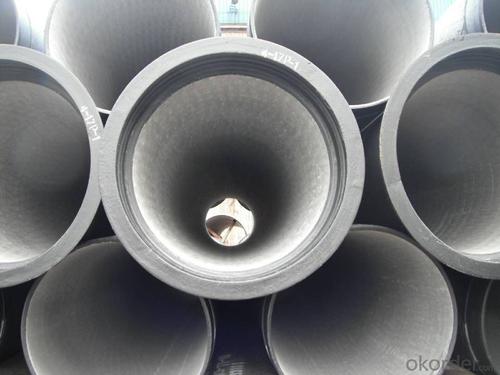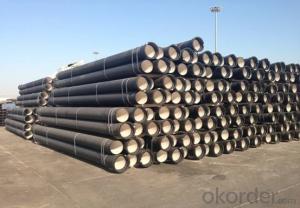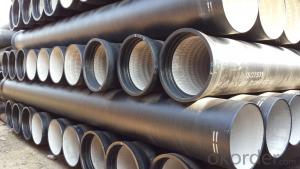DUCTILE IRON PIPE DN1600
- Loading Port:
- China Main Port
- Payment Terms:
- TT OR LC
- Min Order Qty:
- -
- Supply Capability:
- -
OKorder Service Pledge
OKorder Financial Service
You Might Also Like
Specification:
1) The standard of pipe: ISO2531:1998, K9
2) Effective length: 6m
3) Inner cement line: Portland cement line as per ISO4179
4) Zinc coating: at least 130g/m2 as per ISO8179
5) Bitumen painting: at least 70um as per ISO8179
6) With 100% quantity of NBR ring, or SBR ring, or EPDM ring as per ISO4633
7) DN80mm-800mm
8) High strength, lighter than grey iron, good corrosion resistance, no furring, small flow resistance, easy fixing, long life tome about 100 yeas
9) Produced by Hangzhou chunfeng machine
10) Checked by automatic inspection equipment
11) Composition:
Chemical composition | |||
Chemical composition | Ductile Cast Iron Pipe (%) | Grey iron pipe (%) | Steel pipe (%) |
C | 3.5-4.0 | 3.2-3.8 | 0.1-0.2 |
Si | 1.9-2.6 | 1.4-2.2 | 0.15-0.4 |
Mn | 0.15-0.45 | 0.4-0.6 | 0.3-0.6 |
P | ≤0.06 | ≤0.3 | 0.02-0.03 |
S | ≤0.02 | ≤0.1 | 0.02-0.03 |
Mg | 0.03-0.06 |
|
|
12) Feature:
Mechanical properties | |||
| Ductile Cast Iron Pipe | Grey Iron Pipe | Steel Pipe |
Tensile Strength(Mpa) | ≥420 | 150-260 | ≥400 |
Yield Strength(Mpa) | ≥300 | No Confirmation | No Confirmation |
Bending Strength(Mpa) | ≥590 | 200-360 | ≥400 |
Elongation (%) | ≥10 | Neglected | ≥18 |
Brinell Hardness(HBS) | ≤230 | ≤230 | About 140 |
13) T type mechanical joint
14) Packing: in bulk or container
- Q: Can ductile iron pipes be used in potable water systems?
- Yes, ductile iron pipes can be used in potable water systems. Ductile iron is a suitable material for water distribution systems as it has excellent durability, strength, and corrosion resistance. It is commonly used in potable water systems due to its ability to withstand high water pressure and its long service life. Additionally, ductile iron pipes are also approved by various national and international standards for use in potable water applications.
- Q: Can ductile iron pipe be used for pressure sewer systems?
- Yes, ductile iron pipe can be used for pressure sewer systems. Ductile iron pipe is known for its strength, durability, and resistance to corrosion, making it a suitable choice for various applications, including pressure sewer systems. It can withstand high pressure and provide a reliable conduit for transporting wastewater under pressure. Additionally, ductile iron pipe has excellent joint integrity, which ensures leak-free connections and minimizes the risk of sewer system failures. Therefore, ductile iron pipe is commonly used in pressure sewer systems due to its structural integrity and long lifespan.
- Q: Can ductile iron pipes be used for geothermal systems?
- Yes, ductile iron pipes can be used for geothermal systems. Ductile iron pipes have excellent strength and durability, making them suitable for handling the high temperatures and pressures typically encountered in geothermal systems. Their corrosion resistance and flexibility also make them a reliable choice for transporting geothermal fluid efficiently.
- Q: Can ductile iron pipe be used for water treatment plant applications?
- Ductile iron pipe is indeed applicable for water treatment plant purposes. Renowned for its robustness and endurance, this type of pipe is well-suited for the conveyance of water and other liquids in diverse industrial environments, such as water treatment facilities. Its exceptional resistance to corrosion and capacity to endure substantial pressure and temperature make it an ideal selection for scenarios where the pipe is exposed to chemicals, disinfectants, and other treatment procedures. Moreover, the installation, maintenance, and repair of ductile iron pipe are straightforward, rendering it a cost-efficient alternative for water treatment plant infrastructure.
- Q: How are ductile iron pipes manufactured?
- Ductile iron pipes are manufactured through a process called centrifugal casting. In this process, molten iron is poured into a spinning mold, which creates a centrifugal force. This force helps to distribute the molten iron evenly along the mold's inner surface, resulting in a dense and uniform pipe wall thickness. After cooling and solidification, the pipe is removed from the mold, tested for quality, and then coated with a protective layer to enhance its durability and resistance to corrosion.
- Q: Can ductile iron pipes be used in acidic environments?
- Yes, ductile iron pipes can be used in acidic environments. Ductile iron has excellent resistance to corrosion, including acidic conditions, due to its protective oxide layer. This makes it a suitable choice for applications in which exposure to acids is expected.
- Q: General cast iron prices now
- Hello friends, Tianjin is in Shandong Qingdao 6500 7300 yuan / ton to 7100 yuan a ton of Zhejiang 7500 to 9000 yuan a ton, this is a great relationship, and the production of raw materials, for reference only, we are ductile casting manufacturers, the information can not say 100% accurate but can reference.
- Q: How are ductile iron pipes protected during transportation and storage?
- Various methods are employed to protect ductile iron pipes during transportation and storage, ensuring their integrity and preventing potential damage. The first step involves applying a protective layer, such as epoxy or zinc, to act as a barrier against corrosion. This coating effectively safeguards the pipes from moisture and other corrosive elements during transit and storage. To further safeguard the pipes, they are often bundled together and secured with straps or bands, preventing any movement or shifting that could cause mechanical damage. This bundling not only ensures the pipes remain intact but also facilitates easier handling and transportation in an organized manner. During transportation, the pipes are typically loaded onto pallets or placed in crates, providing additional protection and stability. This minimizes the risk of accidental impact or rough handling that may result in cracks or fractures. Proper labeling and marking of the pipes is crucial to ensure appropriate handling. This includes displaying handling instructions, weight limits, and pipe specifications, preventing mishandling and damage during transportation. Equally important are the storage conditions for maintaining the integrity of ductile iron pipes. They should be stored in a clean, dry, and well-ventilated area, protecting them from moisture and humidity. Direct sunlight and extreme temperatures should be avoided to prevent any potential degradation of the protective coating. In conclusion, protecting ductile iron pipes during transportation and storage involves the application of protective coatings, bundling and securing, suitable packaging materials, proper handling and labeling, and storage in appropriate conditions. These measures guarantee the pipes' quality and structural integrity, ensuring they arrive at their destination in optimal condition.
- Q: Are ductile iron pipes suitable for use in brewery facilities?
- Yes, ductile iron pipes are suitable for use in brewery facilities. Ductile iron pipes are durable, corrosion-resistant, and can withstand high-pressure applications, making them ideal for transporting water, steam, and other fluids within brewery facilities. Additionally, the smooth interior surface of ductile iron pipes minimizes friction and prevents the build-up of sediments or organic materials, ensuring the purity and quality of the beer being produced.
- Q: Can ductile iron pipes be used for stormwater drainage systems?
- Yes, ductile iron pipes can be used for stormwater drainage systems. Ductile iron pipes are known for their strength, durability, and corrosion resistance, making them suitable for various applications, including stormwater drainage. They can handle high volumes of water flow and withstand heavy traffic loads, making them a reliable choice for stormwater management. Additionally, ductile iron pipes have excellent joint performance, ensuring a watertight and secure connection, which is crucial for preventing leaks and maintaining the integrity of the stormwater drainage system. Overall, ductile iron pipes are a viable option for stormwater drainage systems due to their robustness, longevity, and ability to withstand the harsh conditions often associated with stormwater management.
Send your message to us
DUCTILE IRON PIPE DN1600
- Loading Port:
- China Main Port
- Payment Terms:
- TT OR LC
- Min Order Qty:
- -
- Supply Capability:
- -
OKorder Service Pledge
OKorder Financial Service
Similar products
Hot products
Hot Searches
Related keywords


























